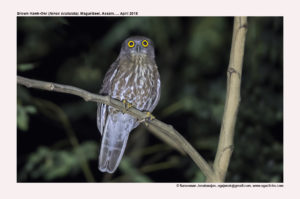
Brown Hawk Owl Ninox scutulata
Etymology:
- Ninox : Derived from genus Greek king Nisus was turned into a Sparrowhawk after his daughter Scylla cut off his purple hair locks to present them to her lover Minos who was also Nisu’s Sworn enemy.
- Scutulata : Latin word for Diamond shape
Distribution in India: Resident of Himalayan foothills, Hills of North East and Andaman Nicobar Island in India.
Description: Size of 27–33 cm; Wt. of 172–227 g. It is smallish to medium-sized, somewhat hawk-like boo book owl with poorly developed facial disc. It has a white patch above bill and longish tail. The upperparts are dark brown with white spots on scapulars; throat is whitish-buff; rest of underparts are whitish with bold rufous-brown blotches; tail is brown with pale bars; eyes are bright yellow; cere is dull greenish; bill is bluish-black. Both the sexes similar in plumage The races differ primarily in size: wing length 207–227 mm in lugubris, 190–212 mm in hirsuta, 206–228 mm in burmanica, 190–203 mm in isolata, 195 mm in palawanensis, 212–228 mm in nominate, 178–183 mm in javanensis, 176–197 mm in borneensis.
Habitat : It is found in tree filled habitats from primary lowland rainforests and mangroves to wooded residential areas, plantations, parks and gardens, near streams and other watercourses. It roosts under thick canopy or among creepers. It is found from sea-level to 1700 m.
Food habits: It eats insects such as beetles, grasshoppers, dragonflies and moths, frogs, lizards, small mammals like bats, small birds and crabs. It hunts from conspicuous perch, where it pounces on prey on ground in typical style of many owls, but also hawks insects in air. It forages at dusk and nocturnally, often searching for prey along the edge of forests.
Breeding habits: They breed in Mar–Apr in Sumatra and Mar–Jun or Jul in India. They nest in tree hollow above ground. They lay a clutch of 2 eggs. The incubation period is 25 days. The nestling period is 24–28 days.